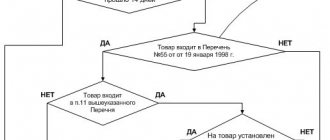The company is not obligated to respond to the complaint
This is true.
The Law on the Protection of Consumer Rights (hereinafter referred to as Law No. 2300-1) does not oblige sellers and manufacturers to respond to consumer complaints. So the company is not obliged to send a letter to the person in response; no one will punish the company for its absence.
However, one should not confuse a response with a reaction to a complaint.
If the consumer is right, then the company is clearly obliged to respond. That is, to fulfill the requirements set out in the claim or the part thereof that is actually justified, if the requirements are excessive.
Moreover, Law No. 2300-1 sets specific deadlines for the reaction (Articles 21, 22, 31):
1) replace the product:
- 7 days - as a general rule;
- 20 days - if an examination is needed;
- 30 days - if a similar product is not available;
2) return the money:
- 10 days.
The deadlines are counted from the day the demand is presented, that is, the claim. The day of its presentation is not the day of dispatch, but the day of receipt by the store (Appeal ruling of the Moscow City Court dated December 2, 2013 No. 11-36573).
General provisions
Unfortunately, no one is safe from purchasing low-quality goods. But not everyone knows that there is a law that regulates the relationship between sellers and buyers - this is the Federal Law of the Russian Federation “On the Protection of Consumer Rights” . According to this law, the buyer has the right to:
- Replacement of goods;
- Refund for purchase;
- Discount on goods if there are quality defects;
- Replacement of goods with a more expensive one with additional payment;
- Free elimination of product defects.
Typically, store employees are reluctant to part with proceeds, so in order to assert their rights, you need to know which articles of the law to rely on. In case of returning or replacing goods, this will be Art. 18, 19,21, 25 Federal Law of the Russian Federation “On the Protection of Consumer Rights” and Art. 309, 310 of the Civil Code of the Russian Federation.
According to these articles, the buyer has the right to replace not only goods of inadequate quality, but also those goods that for some reason did not fit (size, dimensions) . However, this right is valid if no more than 2 weeks have passed since the date of purchase and the packaging and the product itself are not damaged.
In addition, store employees may refuse to return money for a purchase if the buyer does not have a cash receipt. By these actions they violate Article 18 of the Federal Law of the Russian Federation No. 2300-1, which explains that the absence of a purchase receipt cannot be a reason for refusing to replace the product or return the money.
Pre-trial procedure for resolving disputes between the buyer and the store
The pre-trial procedure for resolving disputes is quite widely used both between legal entities and individuals. The Federal Law of the Russian Federation “On the Protection of Consumer Rights” provides for 2 options for resolving conflict situations :
- Pre-trial procedure (negotiations, writing a claim).
- Going to court.
However, one option does not exclude the other. That is, if a person filed a claim with a store, after the review period has expired, he can go to court.
Do you have a question about the time frame for reviewing a claim?
Ask an experienced consumer rights lawyer for a FREE consultation!
Hotline in Moscow: 8 (495) 131-95-79
Ask a Question
In most cases, going to court with a complaint about a defective product is not a mandatory claim. This means that the consumer can file a claim without first contacting the seller .
However, most often, it is an appeal to the seller/manufacturer that allows you to resolve the issue and restore justice. If the buyer has every reason to receive money for the purchase, or to replace it, sellers rarely take the matter to court and satisfy the buyer's demands.
When filing a claim, the buyer has the right only to return the money or replace the product; compensation for moral damage can only be demanded through the court (Article 15 of the Federal Law of the Russian Federation No. 2300-1).
Why don’t sellers bring the matter to court and agree to a pre-trial procedure for resolving the dispute? There are several reasons for this:
- In addition to compensation for the buyer’s material costs, the court may order an amount to be paid for moral damage;
- If, before filing a claim, the buyer wrote a claim to the store, and the store employees did not respond to it, the court may impose a fine on the organization in an amount equal to the amount of the claim;
- In order to defend your position in court, you will need a lawyer. Not all stores have a full-time employee, but hiring a lawyer is an additional waste of money.
If you look at it, it is also easier for the buyer to file a claim with the store rather than waste time on litigation. Hence the conclusion: before filing a lawsuit, try to resolve the issue peacefully.
You can learn about all the nuances of filing a claim for returning goods by reading this article.
The claim requires the goods along with money
It's a valid point, it shouldn't be like this.
The consumer can demand or exchange the product for a similar one, or accept it back and return the money.
He has no right to ask for both at the same time. This would be unfair, which is why law No. 2300-1 does not provide for it.
Consequently, if the seller sees that the claim contains two specified requirements at once, then he has the right to consider them mutually exclusive and not satisfy either one or the other.
The company cannot choose which of them to satisfy at its own discretion, since the law does not authorize it to do so. The right to choose a claim is the sole prerogative of the buyer.
Taking into account the above, when faced with a claim of mutually exclusive content, the organization has the right to leave it without satisfaction until the consumer clarifies his intentions (Appeal ruling of the Moscow City Court dated January 18, 2018 No. 33-1447/2018).
Who to submit to
When resolving a conflict regarding a low-quality product, the claim must be submitted to the seller, an authorized organization or individual entrepreneur . Art. 18 of the RFP provides the opportunity to contact the manufacturer or importer directly if demands are made to replace the product with a new one, eliminate defects, or pay for repairs carried out by another company.
These participants in legal relations can return the goods and ask for payment . If an agreement has been concluded for the provision of services or performance of work, then the application is submitted to the contractor.
This is important to know:
Termination of the work contract here.
What to do if the work was performed poorly in this article.
The concept of an authorized organization or individual entrepreneur is given in the preamble to the RFP. These include firms or entrepreneurs who have entered into an agreement with the manufacturer to satisfy consumer requirements for inadequate quality of goods or work results.
The claim was not received by the organization
A good argument.
The court may recognize it if the consumer fails to refute it. That is, it will not present to the court evidence that the claim was sent and delivered, and company representatives will deny in court that they received the letter by mail or that the citizen brought it personally to the organization’s office (Appeal ruling of the Moscow City Court dated October 4, 2016 No. 33-38862 /2016).
If a person provides evidence of sending a claim to a legal address or attempting to serve it in person, then the court will take his side. For example, the consumer can show his copy of the complaint, on which witnesses confirmed with their signatures that the company representatives refused to sign for receipt of the claim (Appeal ruling of the Moscow City Court dated June 28, 2018 No. 33-27889/2018).
The claim was submitted only orally
A good argument, but in practice, as a rule, it does not work.
The fact is that Law No. 2300-1 does not oblige consumers to express their complaints in writing. Therefore, judges count both the claims presented and the claims presented orally by citizens. True, provided that this is somehow confirmed.
For example, after a consumer’s request, the store sent the product for examination (Appeal ruling of the Moscow City Court dated June 2, 2017 No. 33-20220/2017). Or the claims were expressed by a person on the hotline, and the conversation with the operator was recorded (Appeal ruling of the Moscow City Court dated December 6, 2016 No. 33-48850/2016).
The claim came only by email
A similar argument, and also usually not accepted by the courts.
Filing a claim by email to a company is acceptable if its address is indicated in the contract or on the organization’s website. In this case, the courts take into account whether the company responded. If she entered into correspondence, then this fact confirms that the claim was received (Determination of the Moscow City Court dated October 19, 2018 No. 4g-12927/2018).
Moreover, an electronic claim is recognized if the contract or work order stipulates that the parties can exchange SMS messages or email about the progress of the contract (Appeal ruling of the Moscow City Court dated February 28, 2019 No. 33-5010/2019).
The Supreme Court explained how to comply with the pre-trial procedure for resolving a dispute
On July 22, 2021, the Supreme Court of the Russian Federation approved a review of the practice of application by arbitration courts of the provisions of procedural legislation on mandatory pre-trial dispute resolution, the provisions of which must be taken into account in the current judicial work of companies.
For which disputes is pre-trial settlement not mandatory?
The claim procedure is mandatory in cases provided for by law (Part 5 of Article 4 of the Arbitration Procedure Code of the Russian Federation and other norms) or by agreement. As the Supreme Court of the Russian Federation explained, this procedure is not applicable to claims for foreclosure of a pledge, claims for compensation for damage (Chapter 59 of the Civil Code of the Russian Federation) and cases for which the Arbitration Procedure Code of the Russian Federation establishes special rules for consideration (corporate disputes, cases in the order of writ proceedings, etc.). d.).
In addition, the Supreme Court of the Russian Federation recalled that compliance by the assignee with the pre-trial procedure for settling a dispute is not required if such a procedure was followed by the original creditor before notifying the debtor of the assignment of the right. When filing a counterclaim, it is not necessary to submit a claim if the counterclaim is based on the same legal relations and the substance of the counterclaim is discerned from the content of the response to the claim.
The claim can be sent to the address specified in the contract, incl. by email
The RF Supreme Court confirmed that the claim can be sent to the address specified in the contract (for example, for correspondence). If the claim is sent by Russian Post, drawing up an inventory of the attachment is not necessary, but only if the plaintiff did not send other correspondence to the defendant during this period.
You can send a claim by email if this is expressly provided for in the contract and the parties have agreed on the email address to which such a claim can be sent.
| In order not to miss legally significant messages during personnel changes, you can provide a general corporate email address for complaint correspondence, which can be accessed not only by the employee responsible for working with the counterparty. We recommend in all cases to create an inventory of the attachment to avoid difficulties with identifying the postal item. |
The procedure for pre-trial dispute resolution must be detailed in the contract
Many contracts contain a general provision on resolving disagreements through negotiations, but in the absence of detail, it does not eliminate the need to submit a claim.
| The procedure for conducting negotiations or mediation must be regulated in detail by the contract so that the corresponding actions can be qualified as compliance with a non-prejudicial procedure for resolving a dispute. |
The claim procedure is considered to be complied with in the event of an arithmetic error in the claim or an increase in the period for accrual of the penalty after filing the claim.
In itself, the discrepancy between the amounts in the claim and the claim is not a violation if the claim specifies the circumstances on which the claim is based and corresponds to the terms of the contract, and the difference in the stated requirements is due to an error in calculations or a continuing delay in execution.
| When drawing up claims, we recommend that you describe in detail the grounds for the claims with reference to primary documents and the relevant terms of the contract. The periods of occurrence of the principal debt and the amount of debt for each of the periods that have expired at the time of filing the claim must be indicated in the claim without fail. |
Pre-trial settlement suspends the limitation period
Compliance by a party with the requirements for mandatory pre-trial settlement of the dispute suspends the limitation period for the period of actual compliance with the claim procedure. Failure to receive a response to a claim within 30 days or another period established by the contract is equivalent to a refusal to satisfy the claim received on the 30th day or on the last day of the period established by the contract.
Failure to comply with the pre-trial settlement period may result in the return of the claim
Submitting a claim to court before the deadline for consideration of the claim has expired, provided that no response has been received, prevents the consideration of the dispute.
| The RF Supreme Court emphasizes that the pre-trial settlement period must expire by the time the documents are sent to the court. You should not count on the expiration of the pre-trial settlement period by the time the issue of accepting the claim for trial is resolved. |
It is necessary to report non-compliance with pre-trial procedure in the court of first instance
The argument about non-compliance with the pre-trial procedure for resolving the dispute must be raised by the defendant only in the court of first instance. Otherwise, the defendant is deprived of the right to refer to the relevant circumstances in the courts of appeal and cassation.
Consultant help
Pepeliaev Group specialists have extensive experience in both pre-trial dispute resolution and mediation, as well as supporting disputes in the courts and are ready to provide qualified legal assistance in protecting the participants in the process.
The claim was accepted by an unauthorized employee
The argument seems reasonable, but it doesn’t work.
According to the judges, it does not matter who exactly accepted the claim (the CEO or the seller). The main thing is that in principle it was received by the company (Appeal ruling of the Moscow City Court dated September 22, 2017 No. 33-37991/2017).
Courts use Article 165.1 of the Civil Code of the Russian Federation on the delivery of legally significant messages. It says that such a message (the claim also applies to it) is considered delivered even if it is received by the person to whom it is sent, that is, the addressee.
Therefore, the companies’ reference to the fact that a postal employee, be it Russian Post or DHL, when handing over an envelope with a claim, was not convinced of the authority of the receiving employee and did not ask to show a power of attorney, is not accepted by the courts. The claim was delivered to the company’s address, this is enough (Appeal ruling of the Moscow City Court dated 03/06/2019 No. 33-10391/2019).
The company was ready to satisfy the claim
The effectiveness of this argument depends on whether the firm could actually satisfy the claim.
In itself, such an impulse does not count, since Law No. 2300-1 requires that the consumer’s demands be fulfilled, if they are justified. That is, no later than on the 7th day, the goods must be replaced, or no later than on the 10th day, the money must be delivered in cash or transferred to an account.
The response to the claim that the company was ready to pay is not recognized by the courts as fulfillment of the claim. After all, the calculation has not actually been made. The intention to satisfy the consumer’s demand without actually transferring funds to him is not the fulfillment of an obligation, and therefore cannot be the basis for exemption from paying a fine (Determination of the Judicial Collegium for Civil Cases of the Supreme Court of the Russian Federation dated November 13, 2018 No. 80-KG18-10).
At the same time, in order to replace the product or return the money, the company must have a real opportunity to do this.
Therefore, the situation will be different if the company would be happy, for example, to exchange a defective product for a quality one, but the consumer did not provide it with such an opportunity. Let's say he did not come to the store with a claim to replace the product, but sent his complaint by mail. However, after the company sent him a letter in response saying that it was ready to make a replacement, he never came. Then the court should not impose any fine on the company for failure to satisfy the claim voluntarily (Determination of the Judicial Collegium for Civil Cases of the Supreme Court of the Russian Federation dated July 31, 2018 No. 32-KG18-16).
Deadlines
Federal legislation establishes a time period within which the seller is obliged to consider a submitted claim and respond to it.
Legal sources in this case are:
- The Civil Code of the Russian Federation regulates the procedure for terminating and amending a purchase and sale agreement (supply of services, performance of work).
- Federal Law No. 2300-1 establishes standards for sellers and suppliers to consider requests from consumers.
Consideration of the claim
The buyer must consider the received claim statement within 10 days and send the client a response with the decision made - to satisfy the claims made or to assist in this.
In a number of situations, for example, when an examination of a defective product is required, the time frame is extended to 3 weeks .
If the appeal is submitted to government bodies, for example, to Rospotrebnadzor, then their employees are given a period of 30 days .
Satisfy buyer's requirements
Federal Law No. 2300-1 establishes certain deadlines for the seller’s actions to satisfy consumer claims :
- Warranty repair – no more than 45 days . In case of repeated breakdown – no more than a month.
- Exchange of a defective product for another – 1 week .
- Replacement of a defective item if its equivalent is not available in the store - 30 days , allotted for delivery of the product from the warehouse or from the manufacturer.
- Refund if you refuse to purchase: for non-cash payments - 10 days , for cash - 3 days .
Refund
Refunds must be made using the exact same method of payment. This rule was introduced by the tax law on the return of funds to suppress possible attempts to illegally withdraw funds from the bank accounts of trading companies.
The 10-day period established by law is allocated for the seller to transfer money from his account to the client’s bank account. Therefore, in reality, these deadlines may be delayed, depending on the time of the transaction between banks.
The claim was subsequently partially satisfied
It won't matter anymore.
A fine for failure to voluntarily satisfy consumer requirements is collected if the seller has not repaid the entire amount before the “victim” goes to court.
After the latter has submitted a statement of claim to the court, fulfillment of the requirements of the claim is not considered voluntary. Moreover, if the company did not pay all the claims, but only a part, or not immediately after filing the claim, but received a losing decision from the court of first instance. Payment of part of the debt after the occurrence of a claim is not a basis for exempting the seller from paying a fine (Determination of the Judicial Collegium for Civil Cases of the Supreme Court of the Russian Federation dated February 13, 2018 No. 81-KG17-26).
Appeal to the consumer court
If the issue of violation of consumer rights cannot be resolved out of court, you will have to go to court. There are also a number of nuances that you need to be aware of. The Supreme Court has issued a ruling relating to consumer protection and regulating the judicial review of civil cases. Let us dwell only on some important points for the consumer.
Jurisdiction
The task of the consumer protection court is to carefully consider the claim and make a decision on it in favor of the plaintiff or defendant. To initiate legal proceedings, you need to have an understanding of jurisdiction.
In accordance with Art. 17 of Law No. 2300-1, the consumer can independently choose where to send the statement of claim geographically: at his place of residence, at the location of the seller or at the place of the transaction. In this case, the following principles are often adhered to:
- if the defendant is an individual entrepreneur, then the claim is sent to his place of residence;
- if the defendant is a legal entity, then the document is sent to the court at the place of the company’s legal address;
- if it is difficult to attend a court hearing of a claim in another city, then the claim is filed at the plaintiff’s place of residence.
If the defendant is a legal entity with several branches and consumer rights were violated in one of them, he can file a claim at the location of this branch, regardless of the territorial location of the main office.
As for the choice between the magistrate and district court, it depends on the requirements of the plaintiff. The cost of the claim also affects the amount of money that the plaintiff demands to recover from the defendant. This may take into account the cost of the purchased product or service, penalties and losses incurred by the consumer due to the sale of low-quality goods or negligent provision of services. Moral damage is not included in the cost of the claim.
According to paragraph 5 of Art. 23 of the Code of Civil Procedure of the Russian Federation, if the value of the claim is less than 50,000 rubles, a statement of claim must be filed in the magistrate’s court. If the amount of recovery from the defendant is more than this amount, then the claim is sent to the district court.
A number of requirements that the magistrate cannot consider:
- the plaintiff’s demands are not of a property nature (he asks to eliminate defects without returning the cost of services provided);
- it is impossible to estimate the value of the claims;
- among the requirements there is a mention of compensation for moral damage.
A statement of claim with such requirements should be sent to the district court.
How does the consumer protection court work?
The first thing you need to do is consult with a lawyer about drawing up a statement of claim in court for the protection of consumer rights. It must comply with the norms of the Code of Civil Procedure of the Russian Federation and not have ambiguous wording.
Contents of the claim:
- address and name of the court;
- details of the plaintiff and defendant;
- the essence of the problem (there may be circumstances of purchase, complaints about the quality of goods or services, information about the cost of the transaction and other information);
- information about the procedure for out-of-court resolution of the problem, if there was one (here you can indicate the dates of filing the claims, the company’s response to them);
- references to laws confirming the legitimacy of the requirements;
- the requirement is to return the goods, return its cost, terminate the contract, compensate for moral damages, compensate for damages, etc.;
- list of attached documents.
At the conclusion, the plaintiff signs and dates it. The statement of claim is sent to the court according to jurisdiction. If the interests of the consumer are represented in court by another person, information about him must be indicated in the statement of claim. A power of attorney certified by a notary is also attached to it.
The statement of claim will be considered at a court hearing, the date and time of which the plaintiff will receive appropriate notification. During the trial, the court will consider all the circumstances of the case and carefully study the plaintiff’s evidence, including:
- expert opinions;
- witness statements;
- documents (response to a claim, purchase and sale agreement or provision of services, etc.);
- explanations from each side;
- video and audio materials.
At the end of the meeting, a court decision will be made to protect consumer rights or to reject claims. An oral explanation will also be given regarding the decision and the time frame for appealing it. Copies of the court decision will be sent to the parties within five days after the court decision is made.
The most difficult thing to win is if the defendant is a bank, a car dealer, or a medical organization. But even if the defendant’s field of activity is different, there is a risk of losing the trial. Therefore, it is advisable to hire a lawyer who will help at all stages: from collecting evidence and drawing up a statement of claim to representing the interests of the plaintiff in court. This approach increases the chances of success.
The claim was overcharged
It doesn't matter.
If the consumer is fundamentally right, then you just need to pay him a fair amount.
Of course, situations can vary in complexity. Extremely simple: when the consumer demands to return exactly the amount that he paid for the product. It’s more complicated: a person wants, in addition to the cost of the product, to be reimbursed for related expenses, for example, for delivery of the product to his home or for its installation. It’s even more complicated: the cost of the product plus associated expenses, plus moral damages.
The company has the right to disagree with the declared amount. However, if from a legal point of view the consumer is right, for example, the product was truly defective, then the company must express its readiness to satisfy his claims with the proviso that an agreement must be reached regarding the amount to be reimbursed.
It is not worth refusing to restore a citizen’s right, motivating the refusal by the fact that his proven losses amounted to, for example, 100 thousand rubles, and in his claim he demands to pay him 1 million rubles. It is necessary to reimburse the justified 100 thousand rubles (Determination of the Judicial Collegium for Civil Cases of the Supreme Court of the Russian Federation dated May 28, 2019 No. 91-KG19-1).
The claim does not contain consumer account details
This argument is often found in practice, but does not help in the courts.
It is true that consumers do not always indicate their bank details in their claims to transfer funds for the returned goods. It would seem that the company is deprived of the opportunity to transfer money. After all, she doesn’t know where.
However, the courts believe that this is not a hopeless situation. The absence of bank details does not relieve the seller of the obligation to return funds. In addition, the organization has options on how to pay the dissatisfied customer in this case:
- deposit money into the notary's deposit account and inform the buyer about this;
- deposit them into a bank account on demand, and also notify the consumer about this;
- send money by postal order to the address specified in the citizen’s claim;
- give him money in another acceptable way, in particular, by inviting him to a store or office.
The organization has the right to use any of these methods. If she did not resort to them, then she is to blame for the fact that the claim remained unsatisfied (Appeal rulings of the Supreme Court of the Republic of Bashkortostan dated 02/01/2018 No. 33-1728/2018, Perm Regional Court dated 04/20/2015 No. 33-3864).
The complaint does not contain a list of identified deficiencies
This argument will work if the company could not know them, and will not help if the shortcomings became known to it.
In the complaint, the consumer may not indicate what specific defects the product has. After all, objectively it is not always extremely clear what exactly is broken. If the seller cannot establish this, then an examination is carried out to clarify this circumstance.
Therefore, if there is no list of shortcomings in the buyer’s letter, but it appeared in the expert’s subsequent conclusion, then it is considered that the claim was justified, and after the seller organization receives a response from the expert, the consumer’s demands must be satisfied (Appeal ruling of the Perm Regional Court dated November 27, 2017 No. 33-12993/2017).
How long can it be submitted?
The legal time during which a claim can be filed is considered to be the warranty period . As a rule, this period is established in the documents attached to the product or result of work. If it is not defined, then it is considered that it is equal to 5 years for real estate items, and 2 for other things.
But if defects in the product arose before it was handed over to the consumer, if there is strong evidence of this, you can file a claim at a later date.
For example, if the warranty is given for a short period, then you can file a claim within 2 years . If no deadline is provided at all, then claims can be submitted until the end of the service life . The service life is the period established by the manufacturer for the safe use of the product or the result of work for its intended purpose. If such a time period is not described by the manufacturer, then it is considered equal to 10 years.
Please note that if you purchased a technically complex product, you can only return it within 15 days.
Such purchases include cars, motorcycles, cameras, computers, and some household appliances. The full list can be found in the list approved by Government Decree 924 of 11/10/11.
But if a significant defect is found in these goods , they cannot be used for more than a month in each warranty year due to the fact that it is under repair, or after making demands to eliminate the defects, they were not satisfied, then they can be returned at a later date term .
The claim did not refer to moral damages
Such an argument specifically against paying compensation for moral damage is untenable.
The consumer is not obliged to indicate in the claim a requirement for compensation for moral damage in order to later recover this compensation in court. The laws do not prescribe such dependence.
Therefore, it is useless to refer to the absence in the claim of a requirement for compensation for moral damages to the selling company in court.
If the basic demands of the consumer-plaintiff are recognized as valid and are satisfied by the court, then compensation for moral damage at the request of the plaintiff is awarded to him automatically.







